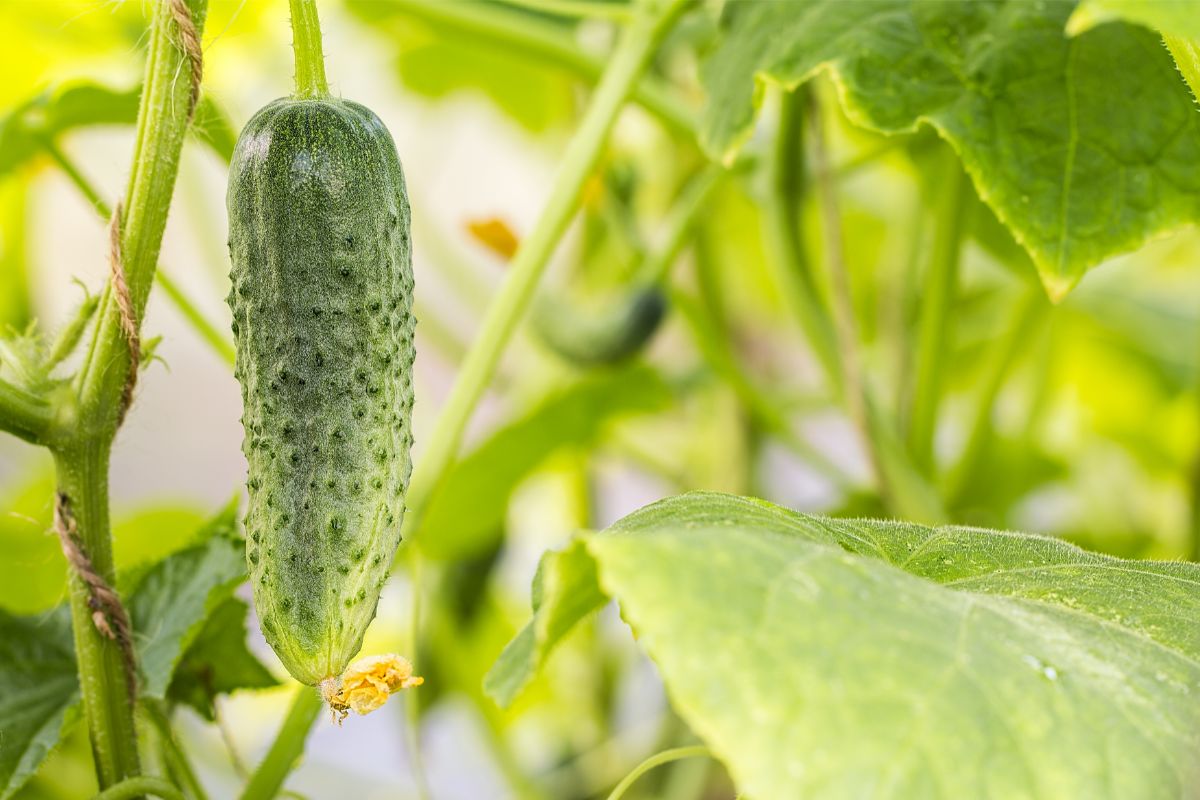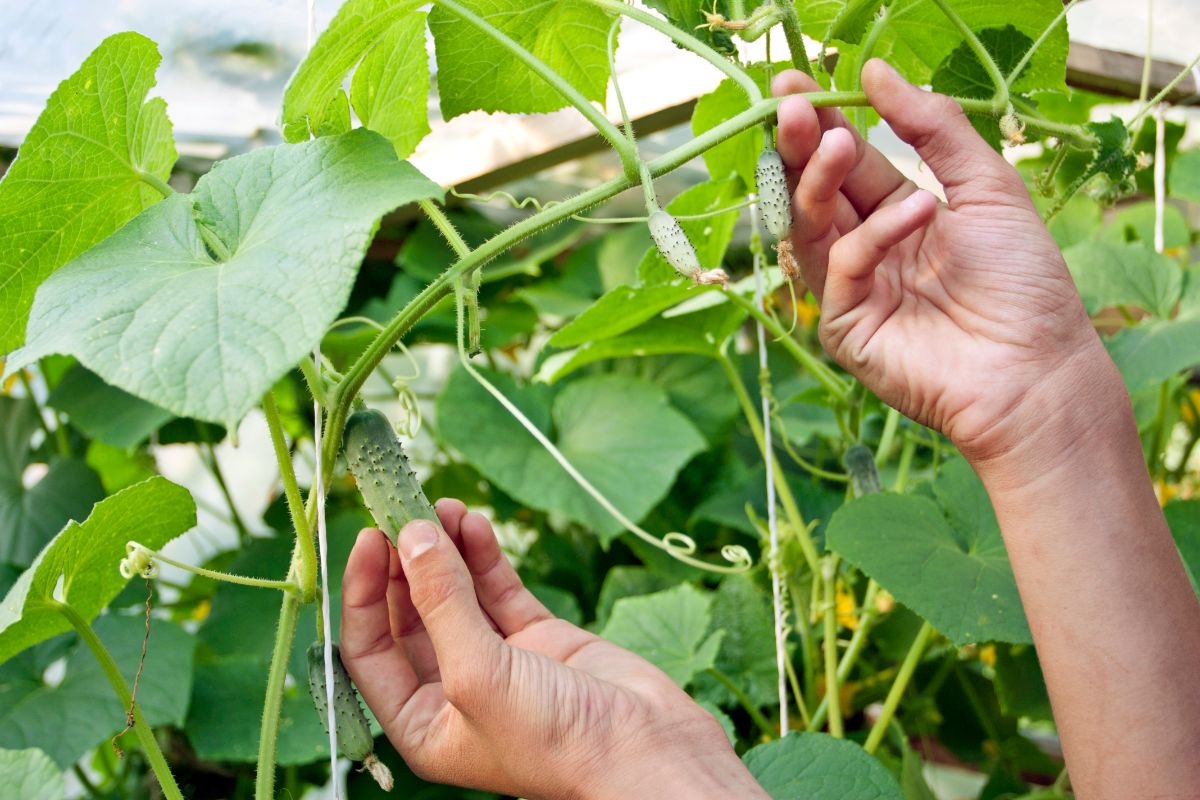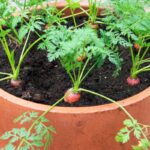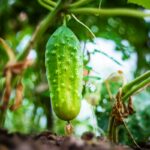Few experiences compare to the delight of growing your own vegetables, and cucumbers, with their cool, crisp texture and refreshing taste, are a particularly rewarding choice for the British summer garden.
Yet, the path to plentiful cucumbers is not always straightforward, and you might sometimes find yourself puzzled by non-growing or underperforming plants – I know I certainly have!

In such cases, understanding the various factors influencing cucumber growth can be key to troubleshooting the issue.
In this comprehensive guide, I’ll share what I’ve learned on my cucumber growing journey and delve into the reasons behind cucumbers not growing, and suggest solutions to ensure a bountiful harvest.
Reasons Why Your Cucumbers May Not Be Growing
There are a variety of reasons your cucumbers might not be growing as expected, including:
1. Insufficient Pollination
Pollination plays a pivotal role in fruit development. Cucumbers rely on pollinators, mainly bees, to transfer pollen from male to female flowers. If pollinators are scarce, which is especially common if you’re growing your cucumber plants indoors, your plants might produce abundant flowers but disappointingly few cucumbers.
To encourage pollination, plant diverse, nectar-rich plants to attract bees to your garden. If bees are in short supply, consider manual pollination using a small paintbrush or cotton bud.
Gently collect pollen from male flowers, which lack a small fruit at the base, and transfer it to the centre of the female flowers.
2. Understanding Soil Quality
Cucumbers favour nutrient-rich, well-drained soil. Insufficient nutrients can hinder growth and affect fruit formation. Key nutrients include nitrogen, which promotes healthy leaf growth; phosphorus, necessary for root development and fruiting; and potassium, which aids overall plant health.
If your cucumbers are struggling, consider testing your soil. A soil test can reveal nutrient deficiencies, enabling you to add the right amendments. Incorporate organic compost or a balanced vegetable fertiliser into your soil to provide a nutrient boost.
3. The Importance of Sunlight
Cucumbers are sun-lovers, requiring 6-8 hours of direct sunlight daily for optimum growth. If your plants aren’t getting enough sunlight, they may grow weak and produce fewer fruits.
Ensure your cucumber plants are located in a spot that receives ample sunlight. However, during the hottest summer days, some afternoon shade can prevent your cucumbers from overheating and developing sunscald.
4. Watering Woes
Watering can be a balancing act. Both overwatering and underwatering can impact cucumber growth. Overwatering may lead to root rot and yellowing leaves, while underwatering can cause the plant to wilt and fruits to taste bitter.
Cucumbers prefer consistently moist soil. Set up a regular watering schedule, aiming to keep the soil moist to a depth of at least 6 inches. A moisture meter can help determine when it’s time to water.
Remember, it’s better to water deeply and less frequently than to give shallow, frequent waterings, which can encourage shallow root development.
5. Contending With Pests And Diseases
Pests and diseases can severely affect cucumber plants. Common pests like aphids and cucumber beetles can cause significant damage, while diseases such as powdery mildew and bacterial wilt can halt growth and damage fruit.
Regularly inspect your plants for signs of pests or disease. If you detect any issues, remove affected plants promptly to prevent the problem from spreading. Introduce preventive measures, like crop rotation, to break pest life cycles and consider using beneficial insects or organic pesticides to control infestations.

As warm-weather crops, cucumbers can be sensitive to temperature variations. Cold temperatures can slow growth or even cause the plant to go dormant, while extremely hot conditions may lead to flower drop, preventing fruit formation.
During the early growing season, consider using row covers or cloches to protect your plants from any unexpected frosts. When temperatures soar, ensure your cucumbers receive sufficient water and consider providing shade during peak afternoon heat.
7. Spacing Significance
Proper plant spacing can significantly influence cucumber growth. Overcrowded plants compete for sunlight, water, and nutrients, which can lead to stunted growth and lower yields.
When planting, adhere to recommended spacing guidelines to ensure each cucumber plant has enough space to grow.
If space is a limitation, you can grow your cucumbers in a pot or perhaps consider vertical gardening by training cucumbers onto trellises or cages, which not only saves space but also improves airflow, reducing disease incidence.
8. Variety Selection
The type of cucumber you choose to grow can also influence your success. Some varieties are more suited to certain conditions or resistant to specific pests and diseases. It’s worth taking the time to research the best varieties for your garden’s conditions and your personal taste.
9. The Role of Fertilisation
While we’ve discussed soil nutrition, a regular feeding schedule can further ensure your cucumbers receive all necessary nutrients. An all-purpose vegetable fertiliser applied according to package instructions should suffice.
However, avoid over-fertilisation, which can lead to lush foliage but fewer fruits.
Final Thoughts
Growing cucumbers can be an exciting venture, and with the right knowledge, you can overcome most growth challenges.
Don’t be disheartened if you encounter issues along the way – we all encounter problems when growing our own produce.
With patience, perseverance, and the practical solutions offered in this guide, you’ll be well-equipped to turn your cucumber-growing journey into a gratifying success.
After all, the thrill of gardening lies not just in the harvest, but also in understanding and nurturing the process of growth itself.
- Can You Grow Bell Peppers Indoors? A Guide For New Gardeners - November 14, 2023
- Composting Basics: Can You Compost Mushrooms? - November 6, 2023
- A Gardener’s Guide To Growing Carrots In Raised Beds - November 1, 2023






